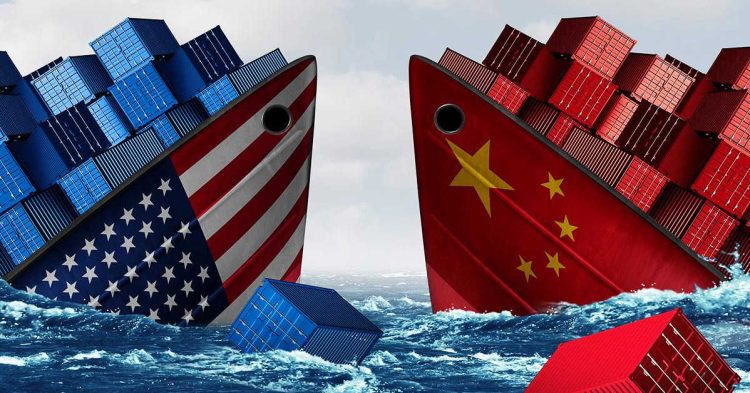For decades, the economic interdependence between the United States and China has been the bedrock of global trade. The two largest economies in the world not only traded goods and services but also shared technology, capital, and talent in ways that facilitated mutual growth. However, the landscape of international commerce is beginning to shift in profound and unpredictable ways. The World Trade Organization (WTO) recently confirmed what many had long suspected: the United States and China are heading toward an irreversible trade decoupling. This pivotal moment—one marked by economic disintegration rather than integration—raises critical questions about the future of global trade, economic blocs, and the broader world economy. What are the real costs of this decoupling, and what does it mean for the geopolitical and financial systems that have flourished over the last three decades?
The WTO’s Confirmation: A Watershed Moment for Global Trade
The announcement from the WTO signifying the confirmation of the US-China trade decoupling did not come as a surprise to many economists, who have been observing a gradual unraveling of the relationship for years. While the early warning signs of this split were visible in the form of tariffs and trade wars initiated by the Trump administration, the confirmation by the WTO marks a crucial institutional recognition of a trend that has accelerated in the wake of rising geopolitical tensions, especially post-pandemic.
The decision does not only reflect the bilateral strains between the two countries but also signals a seismic shift in the global trade order. The WTO, as the primary arbiter of international trade rules, has historically sought to maintain multilateralism. The decoupling, as confirmed by the organization, challenges this principle, potentially splintering the world into separate economic zones. In this new order, nations will need to decide whether to align with the US or China, with the risk of losing access to the markets of both powers.
The shift is not merely political but also profoundly economic. The decoupling has disrupted trade patterns that have been in place for decades, creating a new era of trade fragmentation that will have consequences for global growth, supply chains, and innovation.
Global GDP Forecasts: A Recessionary Ripple Effect
One of the most immediate and profound effects of US-China decoupling is on global GDP. According to the latest forecasts from the International Monetary Fund (IMF), the world economy stands to lose approximately 1.5% of global GDP growth annually due to the disintegration of the US-China economic relationship. This figure may seem small on paper, but it translates to trillions of dollars in lost economic activity.
At the core of this disruption is the severance of two key components of the global supply chain. Historically, the US has provided China with advanced technology and capital, while China has supplied the US with low-cost manufacturing and consumer goods. The loss of access to these resources will not only affect trade volumes but also impact productivity, efficiency, and innovation.
For instance, the semiconductor industry—already strained due to earlier tariffs and the ongoing chip shortage—faces even more significant challenges. Both the US and China have substantial stakes in the development and production of cutting-edge chips. However, with decoupling, the supply chain for semiconductor chips will become more fragmented. This could slow technological advancements, particularly in sectors like AI, telecommunications, and electric vehicles, where cutting-edge chips are essential.
The decoupling also weakens the global trading system by discouraging foreign direct investment (FDI). Companies seeking to maintain access to both US and Chinese markets may scale back investment or shift operations to less politically charged regions, resulting in slower global growth. Countries in the developing world, which have benefited from both American and Chinese investment, will be hit particularly hard as the flow of capital from both sources diminishes.

Emerging Economic Blocs: The New Polarization of Global Trade
As the US and China move further apart, the world is witnessing the emergence of distinct economic blocs. The West, led by the US and its allies in Europe and the Asia-Pacific region, will continue to operate within a capitalist, rules-based economic framework. Meanwhile, China is building an alternative network through initiatives like the Belt and Road Initiative (BRI) and increasing its focus on creating its own technological standards and supply chains, independent of Western influence.
The decoupling is not just a shift in trade patterns but also a reorganization of the global political economy. For example, the US and the European Union have begun exploring deeper trade partnerships and are focusing on creating technological standards that exclude China. This could lead to the establishment of separate technological ecosystems, one dominated by the US and its allies, and another increasingly controlled by China.
China’s position is particularly strengthened by its increasing economic influence over Africa, Latin America, and parts of Southeast Asia, where the US has had historically strong ties. The decoupling creates a rift in the global order, but it also offers China an opportunity to solidify its position as the dominant economic power in these regions. Through strategic investments, favorable trade terms, and growing influence in international organizations, China aims to build a sphere of influence that increasingly operates outside the US-led economic system.
This growing polarization has wide-ranging implications. Countries must now navigate this bifurcation, with many having to choose between aligning with the US-led bloc or China’s. Some nations, such as India and Brazil, are adopting a more neutral stance, but even they are facing pressure to pick sides as the US and China increasingly view global trade relations through a zero-sum lens.
Multinational Corporations: Adapting to the New Normal
For multinational corporations (MNCs), the US-China decoupling presents a unique set of challenges and opportunities. Over the past three decades, companies have built complex global supply chains that rely heavily on both American innovation and Chinese manufacturing. Companies such as Apple, Tesla, and Microsoft have been at the forefront of this interdependence, with China serving as a crucial manufacturing hub and market for their products.
However, the decoupling is forcing companies to reconsider their strategies. Many are shifting operations out of China and diversifying their supply chains to avoid being caught in the middle of an economic cold war. For example, companies are increasing their investments in Southeast Asia, India, and even Africa, seeking to reduce their reliance on Chinese manufacturing while also ensuring access to global markets.
At the same time, MNCs are grappling with the potential reorganization of technological ecosystems. Companies in the semiconductor, AI, and telecommunications sectors, in particular, are facing a choice between two competing standards—one promoted by the US and its allies, and one backed by China. For many firms, this may mean the need to pick sides, with potentially massive costs in terms of innovation, market access, and regulatory compliance.
As the US and China decouple, the world is likely to see a surge in regional supply chain alliances. We may also witness the rise of new trade agreements that focus on creating safe, independent trading zones where companies can continue to operate with minimal disruption.
Conclusion: The Cost of a Broken Relationship
The decoupling of the US and China is an event of unprecedented scope. Its effects are not limited to trade volumes or GDP growth; they extend to the very fabric of the global economic system. We are entering a period of bifurcation, where two separate economic and geopolitical spheres are emerging, each with its own set of rules, standards, and alliances. The consequences for global trade, investment flows, and multinational corporations are profound, and the world will need to adapt to this new reality.
The cost of this breakup is not just financial but also geopolitical. As countries and companies recalibrate their strategies, the hope is that the shift will lead to new forms of cooperation and competition—though the path forward is uncertain. In the end, the decoupling of the US and China may mark the beginning of a new chapter in global trade, one that reshapes the contours of international relations for decades to come.






























